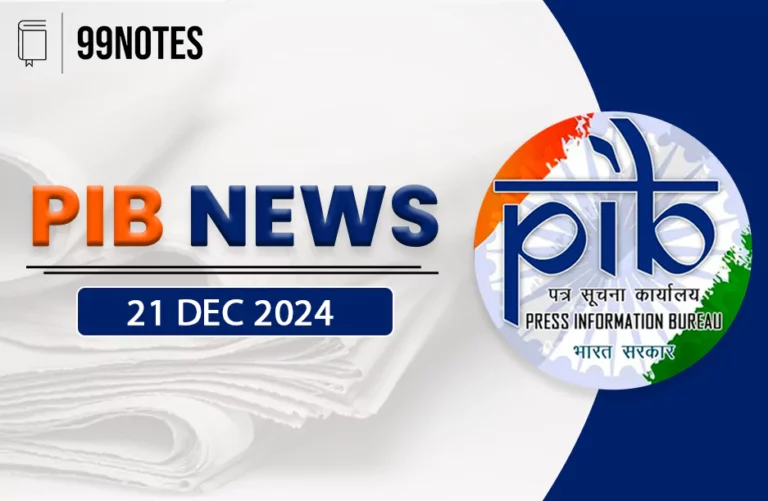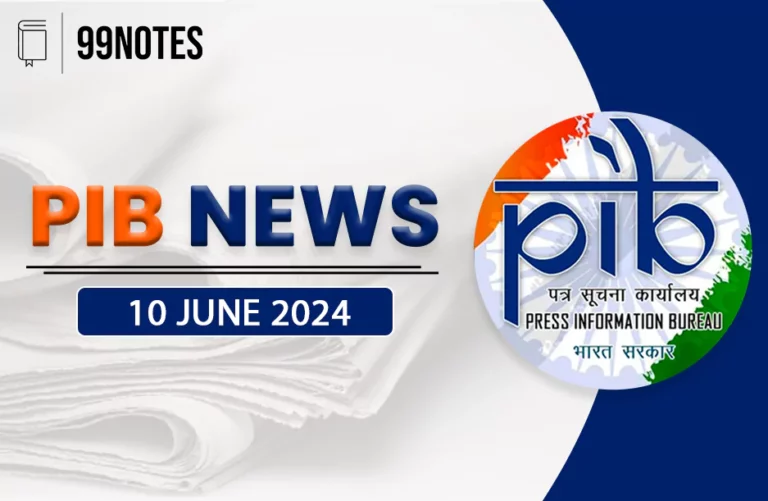17 April 2024 : PIB Summary for UPSC
PIB Summary for UPSC
17-April-2024
1. CBDT signs record number of 125 Advance Pricing Agreements (APAs) in FY 2023-24.
|
Topic: GS3 – Indian Economy – Effects of liberalisation on the economy. Understanding Advance Pricing Agreements (APAs) is crucial for tax administration and promoting ease of doing business. |
| Context |
| ● The news is about the Central Board of Direct Taxes (CBDT) signing a record 125 Advance Pricing Agreements (APAs) with Indian taxpayers in FY 2023-24. |
Additional information on this news:
- CBDT signed a record 125 Advance Pricing Agreements (APAs) with Indian taxpayers in FY 2023-24.
- This includes 86 Unilateral APAs (UAPAs) and 39 Bilateral APAs (BAPAs).
- It marks the highest ever APA signings in any financial year since the launch of the APA programme.
- The number of APAs signed represents a 31% increase compared to the previous financial year.
- Total APAs since inception now stand at 641, comprising 506 UAPAs and 135 BAPAs.
- Maximum number of BAPAs were signed in FY 2023-24 compared to any previous financial year.
- BAPAs were signed with India’s treaty partners including Australia, Canada, Denmark, Japan, Singapore, UK, and US.
- APA Scheme provides certainty to taxpayers in transfer pricing, specifying pricing methods and determining arm’s length price of international transactions.
- Taxpayers can opt for rollback of APA for four preceding years, providing tax certainty for nine years.
- Bilateral APAs offer protection from anticipated or actual double taxation, aiding ease of doing business for Multi National Enterprises (MNEs).
| What are Advance Pricing Agreements (APAs)? |
|
● Definition: Advance Pricing Agreements (APAs) are agreements between a taxpayer and tax authority (such as the IRS in the United States or the CBDT in India) regarding the transfer pricing methodology for cross-border transactions. ● Purpose: APAs provide certainty and clarity to taxpayers regarding the transfer pricing treatment of their transactions, reducing the risk of disputes and double taxation. ● Types: APAs can be unilateral (between taxpayer and one tax authority), bilateral (between taxpayer, home country tax authority, and host country tax authority), or multilateral (involving multiple tax jurisdictions). ● Coverage: APAs typically cover a specific set of related-party transactions, such as sale of goods, provision of services, or licensing of intangibles. ● Process: The APA process involves submission of an application by the taxpayer, negotiation with tax authorities, and agreement on transfer pricing methodology and terms. ● Duration: APAs have a fixed term, usually ranging from three to five years, during which the agreed transfer pricing methodology is applied to covered transactions. ● Compliance: Taxpayers are required to comply with the terms and conditions of the APA, including annual reporting and documentation requirements. ● Benefits: APAs provide benefits such as reduced compliance costs, avoidance of penalties, improved tax planning, and enhanced business certainty for multinational enterprises. Advantages: ● Certainty: APAs provide certainty to taxpayers by determining the appropriate transfer pricing methodology in advance, reducing the risk of disputes with tax authorities. ● Compliance: Taxpayers can align their transfer pricing policies with APA terms, ensuring compliance with tax regulations and avoiding penalties. ● Efficiency: APAs streamline the transfer pricing process, reducing the time and resources spent on negotiations and audits. ● Strategic Planning: With predictable transfer pricing arrangements, taxpayers can engage in long-term strategic planning, including investment decisions and business restructuring. ● Cost Savings: APAs can lead to cost savings by minimising the need for costly transfer pricing documentation and dispute resolution. ● Reputation: Participating in APAs demonstrates a commitment to transparency and compliance, enhancing a taxpayer’s reputation with tax authorities and stakeholders. ●International Consistency: APAs promote consistency in transfer pricing practices across jurisdictions, reducing the risk of double taxation and promoting international trade and investment. ● Customization: APAs can be tailored to specific transactions or industries, allowing taxpayers to address unique transfer pricing challenges effectively. ● Resource Allocation: By providing certainty and reducing compliance burdens, APAs enable taxpayers to allocate resources more efficiently to core business activities. ● Legal Protection: APAs offer legal protection to taxpayers by formalizing agreed-upon transfer pricing methodologies, reducing the risk of retrospective adjustments by tax authorities. |
| Practice Question: What are Advance Pricing Agreements (APAs), and how do they contribute to promoting ease of doing business in India? (150 Words /10 marks) |
For Enquiry

17 April 2024 : PIB Summary for UPSC

17 April 2024 : The Hindu Editorial Notes PDF

17 April 2024 : Indian Express Editorial Analysis

UPSC Topper 2024 List Released, Aditya Srivastava Tops

Top 7 Best IAS Coaching in Ghaziabad

16 April 2024 : Daily Current Affairs Quiz

16 April 2024 : Daily Answer Writing

16 April 2024 : Daily Current Affairs

16 April 2024 : PIB Summary for UPSC

16 April 2024 : The Hindu Editorial Notes PDF
April 2024 PIB 17 April 2024 : PIB Summary for UPSC PIB Summary for UPSC
17-April-2024
1. CBDT signs record number of 125 Advance Pricing Agreements (APAs)…
April 2024 The Hindu Editorial 17 April 2024 : The Hindu Editorial Notes PDF The Hindu EDITORIAL
17-April-2024
1. Navigating life as a consumer with disability.
Topic: GS2 –…
April 2024 Indian Express 17 April 2024 : Indian Express Editorial Analysis Indian Express Editorial Analysis
17-April-2024
1. Moving past bonds
Topic: GS2 – Governance – Government…
Blogs Upsc UPSC Topper 2024 List Released, Aditya Srivastava Tops UPSC Toppers List has been declared on 16 April 2024, Aditya Srivastava from Lucknow has emerged as the…
Blogs Upsc Top 7 Best IAS Coaching in Ghaziabad IAS Coaching in Ghaziabad
If you are Ready to start your UPSC Preparation in Ghaziabad then you should…
Daily Quiz 16 April 2024 : Daily Current Affairs Quiz 16- April 2024 : Daily Quiz…
mains answer writing 16 April 2024 : Daily Answer Writing Mains Answer Writing
16-April-2024
Q1) Even though e-commerce sector is decentralizing global business…
April 2024 Daily Current Affairs 16 April 2024 : Daily Current Affairs Daily Current Affairs
16-April -2024- Top News of the Day
1. Jammu and Kashmir High Court Quashes Detention,…
April 2024 PIB 16 April 2024 : PIB Summary for UPSC PIB Summary for UPSC
16-April-2024
1. INDIAN ARMY CONTINGENT DEPARTS FOR INDIA- UZBEKISTAN JOINT MILITARY…
April 2024 The Hindu Editorial 16 April 2024 : The Hindu Editorial Notes PDF The Hindu EDITORIAL
16-April-2024
1. New data law, a barrier to journalistic free speech
Topic:…




